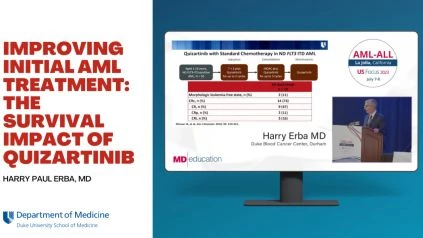Harry Paul Erba, MD Professor of Medicine Member of the Duke Cancer Institute
This content features Harry Paul Erba, MD, who discusses the optimization of frontline therapy for FLT3 mutated AML patients, focusing on quizartinib’s impact. Dr. Erba explains the pivotal role of FLT3 receptor tyrosine kinase in hematopoiesis and its connection to AML blast. He details the variations in FLT3 mutations, encompassing internal tandem duplication (ITD) and TKD mutations, elucidating their distinct prognostic implications.
The RATIFY trial’s examination of midostaurin and the Quantum First study’s exploration of quizartinib is highlighted. Harry Erba, MD delves into a comprehensive analysis of the Quantum First study, revealing how quizartinib, coupled with intensive chemotherapy, notably enhances overall survival, particularly among younger patients. Additionally, the study sheds light on the potential benefits of quizartinib for MRD-positive patients, prompting further research into optimizing survival outcomes, particularly in older adults with AML. The content emphasizes the importance of tailored treatments guided by genetic profiles and mutation burdens, with the ultimate aim of advancing survival rates for individuals with FLT3-mutated AML.

